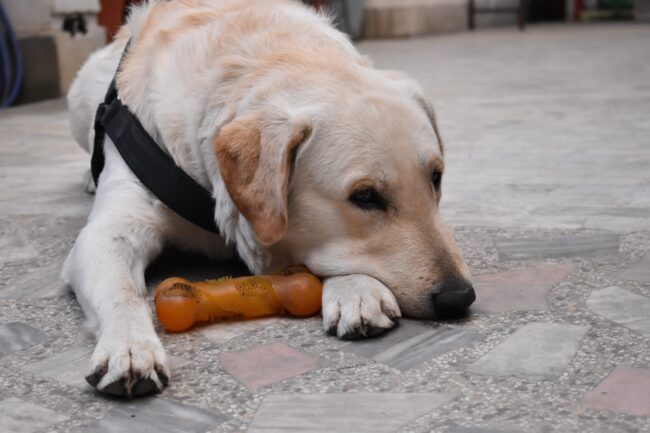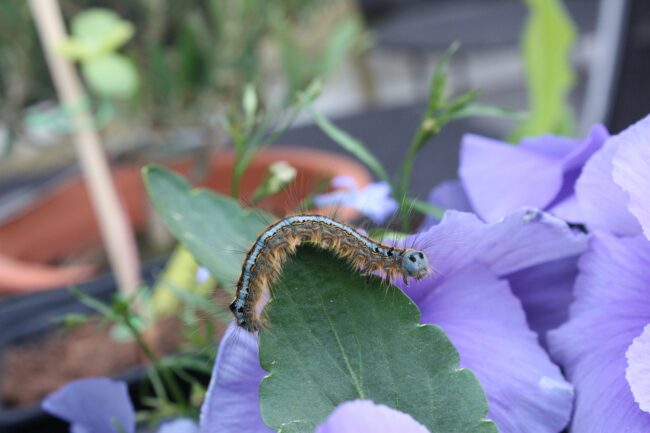Table of Contents
Here’s an unfortunate fact that all dog owners run into. Our canines like to try out new things – especially edible things. Dogs, especially those that feel peckish, as well as young puppies, tend to eat things that they really should not!
One of the worst things you can witness is your dog enjoying a piece of maggot-infested food. Immediately, you might be concerned about how this will affect your dog. Will your pet develop an internal maggot infestation? Will they get sick? Our article covers everything you need to know.
Can Maggots Affect A Dog Internally?
Maggots are larvae of flies and blowflies. They are still in their early stages of development and as adults, they turn into flies themselves. Indeed, you can think of them as baby flies.
As flies move between different sources of food, they leave behind their larvae so that the youngsters can feed and grow. The best place for such fly nurseries is usually rotten meat. Flies love it because there’s normally minimal disturbance and danger to the larvae since predators tend to avoid rotten food.
The good news is that maggots themselves are not toxic to pets. When your dog swallows maggots, its stomach has enough pH levels to take down the larvae, killing them the moment they reach the dog’s stomach. The maggots may even aid in maintaining your dog’s health since they’re high in proteins.
But the real risk comes from the food the maggots were infesting. If they were consuming rotten meat, the latter might cause problems but once again, not the maggots. Spoiled meat can be highly toxic and lead to poisoning and life-threatening gastroenteritis.
With that said, consuming a high amount of maggots may also cause problems like an upset stomach or tummy ache. The dog might vomit to get relief and in normal cases, if the dog only throws up once, that’s nothing to worry about.
When to See a Vet?
Maggots aren’t poisonous, and they aren’t likely to cause any severe complications either.
However, since maggots are foreign to your dog’s stomach, it’s best to consult with a vet over the phone. It is imperative to watch your dog after it ate maggots to notice any signs of illness or discomfort.
The first thing you should do is trace down the rotten meat or the food item that the maggots were infesting. What type of food it is will largely determine what type of treatment the dog would need. Your vet will ask you about the source before recommending medications.
In most cases, the vet will advise you to give your dog access to water and perhaps rest its stomach by withholding food, or maybe feed it a bland diet of chicken and rice for a few days.
What if My Dog Has Wounds?
Things can get complicated if the dog ate maggots while it has internal and external wounds.
Maggots feed on fresh flesh, too, and would pounce on any wounds that they come across. So if your dog was eating a lump of rotten meat infested with maggots, chances are some larvae have found their way into the dog’s wounds.
They will then start to eat the flesh and enlarge your dog’s wounds. If it’s an internal wound, like in the mouth area, you might not even know that maggots are infesting your dogs from the inside. If you’re aware of any wounds, have a vet check the dog to make sure that it’s not suffering from maggot infestation.
If the vet finds maggots, they will remove the larvae, disinfect the wounds and wrap the area with a clean dressing. The vet might also administer antibiotics to speed up the healing process.
What if My Dog Ate Maggot-infested Poop?
When your dog consumed maggot-infested poop, you should treat it like whenever your dog eats poop without maggots (remember, maggots are not really the problem).
The stool can contain parasites and bacteria that might harm the dog. In such cases, the dog will suffer from mild to severe stomach aches, and diarrhea. So there’s nothing much you can do other than treating your dog for diarrhea, and dehydration.
A Quick Summary
Maggots aren’t poisonous or toxic to dogs. So, don’t freak out when you see your dog eat these creepy crawlies! In some cases, maggots might trigger vomiting if eaten in large amounts but this is relatively rare.
However, your job as a pet parent is to assess the danger posed by the foodstuff or materials the maggots were in. Was it rotten meat? A rat that had died of poison? Another dog’s poop? The best course of action is to play it safe. Take your dog to the vet for a complete examination and if necessary, a course of treatment that will make your dog’s upset stomach feel better!


